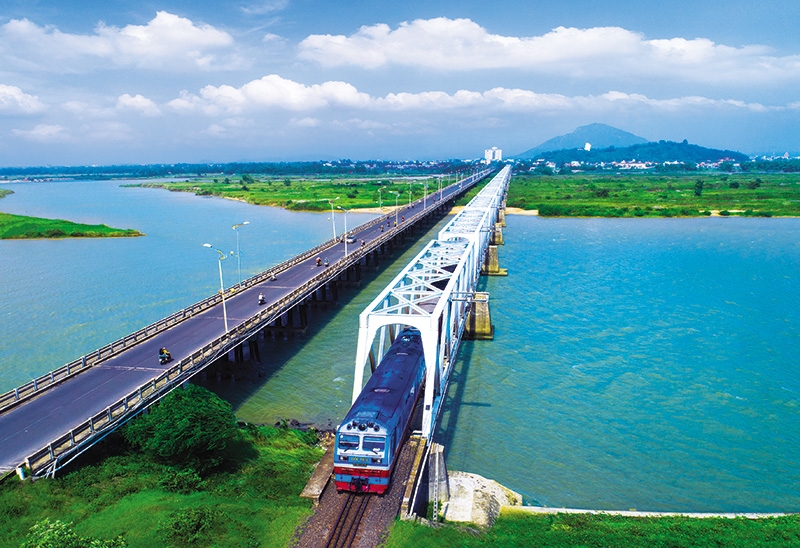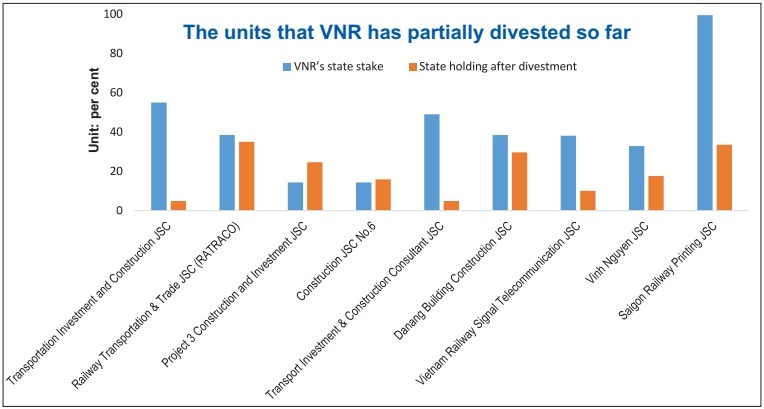Railway stake sales on track
 |
| VNR will divest the state’s capital in 16 subsidiaries in the railway segment |
The operator of all railway lines in the country, Vietnam Railways (VNR) submitted its latest version of the draft restructuring plan for 2017-2020 to the Commission for the Management of State Capital (CMSC), putting the divestment of state capital in focus. The commission will soon adopt the plan and submit it to the prime minister.
Under the latest draft, VNR will divest state capital in 16 units. Specifically, for the subsidiaries listed on the stock exchange or registered to list on the unlisted public company market (UPCoM) that VNR had partially divested, it requested authorisation to set a suitable timeline for selling through the order matching method with the price of the sale not lower than the initial investment value or the book value in the latest financial report.
These companies include the three subsidiaries of Construction JSC No.6, Investment and Construction No.3 JSC, and Transport Investment and Construction Consultant JSC.
For the subsidiaries that VNR has partially sold off in the first divestment round, or those it failed to divest, the group is seeking permission from the Ministry of Transport’s (MoT), which is its manager, to revaluate the state capital and sell the shares in batches (see table).
 |
Regarding the subsidiaries Dong Mo Stone JSC, My Trang Stone JSC, and Railway Services JSC Zone 1 (Rasesco), where VNR is still preparing the divestment, it plans to launch a public auction or, in the case of Dong Mo Stone, selling shares in batch.
For My Trang Stone, VNR will hire a consultancy to revaluate the shares and complete the necessary documents for a divestment via public auction, while Rasesco will have to complete its 2016 audited financial statement before hiring a consultancy.
As part of the new restructuring plan, VNR will also seek domestic and foreign strategic partners for Gia Lam and Di An locomotive workshops. The group will build a roadmap to reduce the state’s stake in the workshops to 51 per cent if it finds a capable foreign partner. VNR now holds 77.37 and 86.85 per cent, respectively, in the two workshops. Regarding railway maintenance JSCs, VNR seeks permission to keep over 51 per cent of their chartered capital, as it does at present.
VNR has, so far, divested the entire state stake in 14 units, while partially divesting nine others. So far it has failed to divest four and have not attempted to sell stakes in three units. It made proceeds of VND597.68 billion ($26 million), a 2.6-fold increase from the initial investment value.
In a report to the MoT, the VNR blamed the failures in divestment on the lower-than-expected trading price of the stocks of its subsidiaries on the UPCoM. What is more, as the ratio of the equity capital in VNR’s hands remains low, it would be very challenging to divest the state capital at these units.
Looking back at 2018, VNR’s state capital divestment plans were only feasible for one out of 15 units. It only successfully offloaded its more than 7.42 million shares at Railway Construction Corporation JSC (RCC), a leading contractor in railway infrastructure construction, under the order-matching method on the securities exchange, gaining VND170.7 billion ($7.42 million) in proceeds.
VNR submitted the first draft restructuring plan in 2017. Since then, the group has been fine-tuning it after the MoT’s comments. The appraisal of the plan is lengthened as VNR was transferred under the CMSC in November 2018, meaning the approval process will start from the beginning.
VNR is expecting the approval of the latest draft any day now to fast-track the divestments. “The delays in the approval of the restructuring plan have caused difficulties for us. Once the new restructuring plan is approved, it will help us increase competitiveness and operational efficiency amid stiffening competition in the transport sector by leveraging private investment,” said a VNR representative.
What the stars mean:
★ Poor ★ ★ Promising ★★★ Good ★★★★ Very good ★★★★★ Exceptional
Related Contents
Latest News
More News
- Kurz Vietnam expands Gia Lai factory (February 27, 2026 | 16:37)
- SK Innovation-led consortium wins $2.3 billion LNG project in Nghe An (February 25, 2026 | 07:56)
- THACO opens $70 million manufacturing complex in Danang (February 25, 2026 | 07:54)
- Phu Quoc International Airport expansion approved to meet rising demand (February 24, 2026 | 10:00)
- Bac Giang International Logistics Centre faces land clearance barrier (February 24, 2026 | 08:00)
- Bright prospects abound in European investment (February 19, 2026 | 20:27)
- Internal strengths attest to commitment to progress (February 19, 2026 | 20:13)
- Vietnam, New Zealand seek level-up in ties (February 19, 2026 | 18:06)
- Untapped potential in relations with Indonesia (February 19, 2026 | 17:56)
- German strengths match Vietnamese aspirations (February 19, 2026 | 17:40)

 Tag:
Tag:




















 Mobile Version
Mobile Version